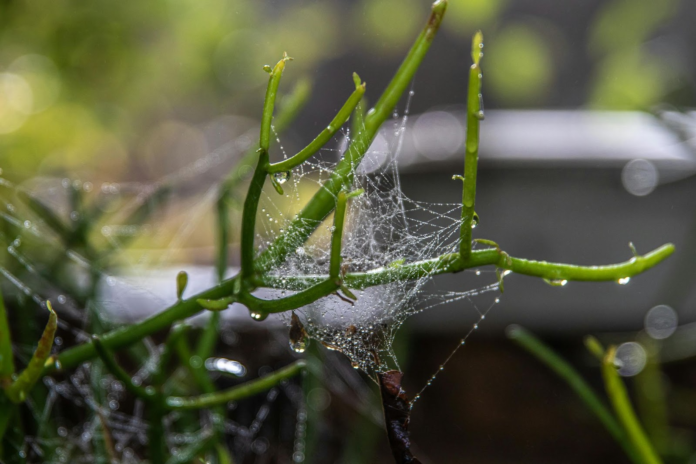As the nights draw in and temperatures drop, UK households have been offered advice on how to deter spiders from their outdoor spaces.
Garden experts from GardeningExpress.co.uk have provided six tips to help families spider-proof their gardens this autumn.
As autumn approaches in the UK, spiders tend to become more active, moving indoors or building webs in gardens as they prepare for winter.
The drop in temperature signals that winter is approaching, which prompts spiders to prepare for survival by securing food sources and safe locations.
It’s during this time that male spiders in particular often leave their outdoor webs to search for mates, while female spiders may start seeking sheltered spots to lay eggs.
This increased activity often leads spiders to venture indoors in search of warmth and safety, or to build webs in more protected areas of gardens, like sheds, greenhouses, and under leaves.
But some families – particularly family members with arachnophobia – might want to deter spiders as much as possible. Spiders can also build unsightly webs around patios, doorways, and plants, making garden areas look messy.
While most garden spiders are harmless and actually beneficial for pest control, their presence can still cause discomfort for people who prefer their outdoor living spaces to come spider-free.
Chris Bonnett from GardeningExpress.co.uk said: “It’s important to try and have a balanced approach when it comes to managing spiders in your garden.
“While many people find spiders unsettling, it’s important to recognise their ecological benefits. Garden spiders are natural predators of pests like aphids, flies, and mosquitoes, which can damage plants. By controlling these populations, spiders contribute to the overall health of your garden.
“That being said, it’s understandable why some might want to deter them. Webs around doorways, patios, or plant beds can be unsightly, and for people with arachnophobia, encountering spiders can be nothing short of terrifying!
“To manage spiders effectively, focus on natural, non-invasive deterrents like maintaining a tidy garden, reducing clutter where spiders can hide, and using plants or essential oils like peppermint or lavender, which naturally repel them.”
Here is Gardening Express’ advice on how to spider-proof your garden this autumn:
- Regular garden maintenance
Spiders love dark, dense places like bushes, shrubs, or overgrown plants, so keeping your garden neat and trimmed reduces the number of hiding spots. Piles of wood, leaves, or unused garden items create perfect nesting areas for spiders, so clear these regularly. Spiders also like tall grass, so keeping your lawn trimmed will make your garden less appealing to them.
- Natural spider deterrents
Spiders dislike the strong smell of certain essential oils. Mix a few drops of peppermint, lavender, or eucalyptus oil with water in a spray bottle, and apply it to areas where spiders may gather like on fences, doorways, or garden sheds. This is a safe, chemical-free solution.
Similarly, spiders are repelled by citrus scents, so you could try scattering lemon or orange peels around areas you want to keep spider-free, or rub them on window sills, doorways, and plant pots. The same goes for vinegar – a simple mixture of white vinegar and water can be sprayed around the garden.
- Reduce lighting
Spiders are attracted to light because it draws insects, which are their food source. Minimise or reduce garden lighting, especially near doors and windows, to decrease the spider’s food supply and discourage them from getting comfy and settling in.
- Physical barriers
Check the exterior of your home and garden sheds for cracks, gaps, or holes. Seal these to prevent spiders from entering. Silicone sealant is a cheap and effective material for this job, and installing fine mesh over vents, windows, and door gaps can prevent spiders from entering these structures.
- Plant spider-repellent plants
Certain plants naturally deter spiders, including lavender, mint, lemon balm, citronella and eucalyptus. These plants not only keep spiders away but also add fragrance and colour to your garden.
- Encourage natural predators
Wild garden birds, hedgehogs, and other natural predators can help control the spider population in your garden. Provide bird feeders or create a hedgehog-friendly space by leaving small openings in fences or hedges.

| [donate]
| Help keep news FREE for our readersSupporting your local community newspaper/online news outlet is crucial now more than ever. If you believe in independent journalism,then consider making a valuable contribution by making a one-time or monthly donation. We operate in rural areas where providing unbiased news can be challenging. |



















